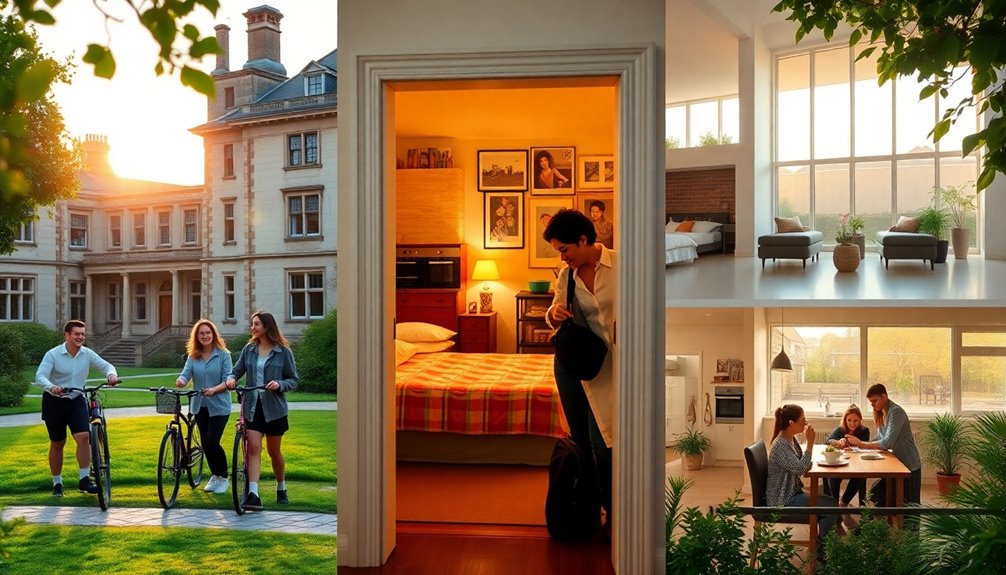
Looking for the best summer English camps in Ireland for teens? You’ll find safe, friendly towns with CELTA/TEFL teachers, small classes for speaking practice, and options like intensive courses, activity-focused programs, or homestays for daily English. Expect boarding, residences, or family stays with full- or half-board, plus supervised outings, excursions, and cultural experiences like music and hiking. Check dates, fees, and safety policies before you book — keep going and you’ll get the specific camp picks and planning tips.
Highlights
- Choose camps with CELTA/TEFL-certified teachers, small class sizes, and age-grouped lessons for effective teen English learning.
- Prioritize programs offering immersive daily English, including homestays or local activities like cafés and walking tours.
- Compare program types (intensive, activity-focused, or blended) to match language goals and interests like surfing or hiking.
- Verify safety: DBS-checked staff, clear emergency plans, staff-to-student ratios, and reasonable curfews.
- Check inclusions, transparent pricing, refund/visa policies, and read multiple student reviews for real-world feedback.
Why Choose Ireland for a Teen Summer English Camp?
Because Ireland blends friendly locals, safe towns, and rich culture, it’s an ideal place for teens to improve English while having fun. You’ll plunge into language immersion daily, practicing conversational skills with peers and hosts in real-life settings, from cafés to walking tours. You’ll get freedom to explore while mentors guide you, so independence grows without risking safety. Cultural exchange happens naturally: you’ll join local traditions, try regional foods, and share your background with new friends, which deepens understanding faster than classroom study alone. Camps balance structured lessons with spontaneous outings, letting you control how much challenge you want. If you crave autonomy and real progress, Ireland gives the space to learn, connect, and grow confidently.
Top-Rated Camps by Location: Dublin, Cork, Galway, and Killarney
In Dublin you’ll find city-campus programs that mix classroom learning with easy access to museums, theaters, and historic sites. In Galway you can expect a strong cultural focus plus surf and outdoor activities that mix English practice with hands-on experiences. Read on to compare these offerings and see which setting fits your teen’s interests.
Dublin: City Campus Highlights
When you choose Dublin for a city campus, you’ll get compact, walkable neighborhoods, lively cultural spots, and easy access to historic sites and modern amenities that make daily life and excursions simple and fun. You’ll explore Dublin landmarks like Trinity College and St. Stephen’s Green between classes, so learning never feels confined. Campus life mixes structured English lessons with spontaneous street music, gallery visits, and evening quizzes in local cafés. You can taste diverse Dublin cuisine — from hearty stews to fresh seafood and trendy brunches — giving you choice every day. Accommodation options put you close to transport, so you can roam independently on weekends. If you crave freedom and variety, Dublin’s city campuses give you roots and room to roam.
Galway: Cultural & Surf Programs
Although Galway’s small size keeps everything close, its blend of arts, live music, and Atlantic waves makes it feel endlessly adventurous — perfect if you want to pair English classes with culture and surf. You’ll study with teachers who push conversation and confidence, then head to the coast for Surf lessons that teach technique and ocean safety — ideal if you crave activity and independence. Evenings bring pub sessions, street performers, and student-led outings, so you’ll keep practicing English in real moments. Cultural workshops explore storytelling, traditional music, and local crafts, giving you hands-on ways to connect with Galway’s spirit. Choose this program if you want structure without restriction and chances to shape your own summer.
Program Types: Intensive English, Activity-Focused, and Homestay Options
Because different teens come with different goals and comfort levels, summer programs in Ireland are split into clear types so you can pick what fits you best: choose intensive programs if you want fast language gains, with focused classes and extra practice that’ll boost confidence quickly. If you crave adventure, activity-focused options mix lessons with surfing, hiking, or city trips so you learn while exploring. For a more personal stay, homestay benefits include daily English practice with a host family, cultural immersion, and a safer, homey base that still gives independence. You can combine choices—intensive mornings, activities in the afternoon, and a welcoming host family at night—so you control how immersive, active, or relaxed your summer ends up.
Age Ranges, Class Sizes, and Teaching Qualifications Compared
If you’re choosing a program, check the age ranges first — camps usually group teens into brackets like 12–14, 15–17, or 18+ so activities and social dynamics match maturity and interests. An age ranges comparison helps you pick peers who share energy levels and goals, whether you want more independence or a guided experience. Next, look at class sizes: a class sizes analysis will reveal whether lessons are intimate (6–10 students) for lots of speaking time or larger (15–20) for varied interaction but less individual attention. Finally, verify teaching qualifications — CELTA/TEFL-certified teachers with youth experience and DBS checks create safe, effective learning. Choose the mix that gives you freedom to learn, explore, and make friends.
Accommodation and Meals: Boarding, Homestay, and Residence Differences

Accommodation choice shapes your daily life at camp — boarding houses, homestays, and student residences each offer different levels of independence, routine, and cultural exposure. You’ll pick boarding options if you want structure: set wake-up times, supervised common areas, and staff nearby. Homestays give you freedom within a family setting — more authentic daily living, local meals, and chances to practice English casually. Student residences are the most independent, with shared studios or dorms, flexible schedules, and peers nearby for late-night chats.
Consider meal plans carefully: full-board gives three meals daily, half-board excludes one, and self-catered lets you control what and when you eat. Choose what fits your appetite for independence and convenience.
Activities, Excursions, and Cultural Immersion Experiences
You’ll choose from daily activities like sports, arts, language workshops, and city or nature outings to balance learning with fun. Guided cultural excursions — think historic castles, coastal villages, and live music nights — will show you different sides of Irish life. These options let you practice English naturally while exploring local traditions and sights.
Daily Activity Choices
Each day offers a mix of structured activities, local excursions, and hands-on cultural experiences designed to keep you engaged and learning outside the classroom. You’ll get choices during activity selection that match student preferences, so you can pick sports, creative workshops, or language labs that fit your mood. Mornings often focus on skill-building sessions; afternoons let you choose freer activities like kayaking, urban games, or café meet-ups with peers. Evening options encourage relaxed socializing—film nights, open-mic events, or informal conversation circles to practice English naturally. Staff guide but won’t micromanage, giving you independence while ensuring safety. The schedule balances routine with flexibility, so you control how immersive your experience is without missing out on shared highlights.
Cultural Excursion Highlights
After choosing how you want to spend your days, it’s time to explore the wider world—our cultural excursions bring Ireland’s history, music, and landscapes to life. You’ll visit castles, coastal cliffs, and lively towns, picking excursions that match your mood: adventurous hikes, chilled beach days, or city street sessions. Hands-on workshops teach you céilí steps, song, and crafts so you can join in, not just watch. Market visits and farm stops connect you with local traditions, food, and friendly voices, while museum tours and storytelling nights deepen your English through real contexts. These cultural experiences are flexible and immersive, giving you freedom to choose how deeply you immerse yourself in Ireland’s scenes and people.
Cost, Dates, and Cancellation Policies: What to Look For
How much should you budget for a summer English camp in Ireland? You’ll want clear cost comparisons between programs — tuition, housing, excursions, and meals — so you can pick the one that gives you freedom without surprises. Check dates closely to match your summer plans and look for flexible start/finish options.
- Compare total price breakdowns and hidden fees.
- Verify exact session dates and arrival/departure windows.
- Read refund policies for cancellations, medical issues, or visa denials.
- Look for payment plans, discounts, or scholarships to stretch your budget.
- Confirm what’s included (transfers, insurance, extra activities).
Ask questions before you pay, keep records of terms, and choose a program that respects your independence and schedule.
Safety, Supervision, and Past Student Reviews
When you’re choosing a camp, prioritize clear safety protocols and adult supervision so you know what happens in everyday life and in emergencies. You’ll want camps that balance freedom with firm safety measures: signed emergency plans, trained staff, curfews that respect independence, and visible supervision during activities. Check student feedback for real insight — past students often note whether rules felt fair or restrictive and how staff handled problems. Look for transparency: incident logs, staff-to-student ratios, and first-aid qualifications. Use reviews to spot patterns, not single complaints, and ask camps for references if you need reassurance. Trust your instincts and pick a program that lets you explore while keeping you protected.
| Topic | What to check |
|---|---|
| Safety measures | Emergency plans, ratios |
| Supervision | Staff training, visibility |
| Reviews | Student feedback, trends |
| Transparency | Logs, references |
Some Questions Answered
Are There Discounts for Siblings or Group Bookings?
Yes — you’ll often get sibling discounts and group rates; camps want flexible bookings so you’ll save when enrolling multiple teens, freeing you to plan together, negotiate better terms, and enjoy reduced fees for shared summer experiences.
Can Dietary Restrictions Be Accommodated in Homestays?
Yes — hosts can accommodate dietary restrictions; you’ll discuss meal preferences in advance so households provide suitable dietary options, and you’re free to request vegetarian, vegan, halal, gluten-free or other specific needs for comfortable homestay living.
Do Camps Assist With Student Visas or Visa Letters?
Yes — camps often help. For example, one parent got a visa letter within days; they’ll guide your visa application, explain the documentation process, and support you so you can travel freely and confidently.
What Medical Facilities Are Nearby for Emergencies?
You’ll find local emergency services, ambulances and walk-in clinics nearby, and hospital proximity is usually under 30–45 minutes by car; you’ll have freedom to explore knowing urgent care and full hospitals are accessible when needed.
Are There Opportunities for Volunteer or Internship Credits?
Yes — you can earn credits: imagine Ava joining a local conservation project that counted for school; many camps link volunteer opportunities and internship programs with partner NGOs, so you’ll gain experience while keeping your freedom.
Summing Everything Up
You’ll leave Ireland’s summer camps with more than improved English — you’ll carry a constellation of memories, new friends, and confidence like a warm breeze tucked into your suitcase. Trust the guides, teachers, and host families who’ll help you grow; they’re the gentle oars steering your curiosity across unfamiliar seas. When you return home, those lessons and laughs will unfold like maps — showing you how far you’ve voyaged and where you might sail next.

https://shorturl.fm/8DTSG
https://shorturl.fm/XUvGL
https://shorturl.fm/qHFOe
https://shorturl.fm/EjO0U
https://shorturl.fm/DxnyK